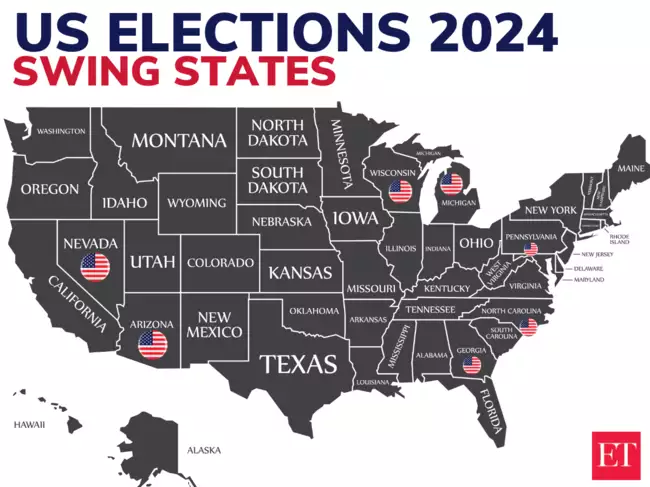
As Election Day draws near, swing state battlegrounds like Georgia and North Carolina are tightening, with both candidates fiercely competing for these critical votes. With just five days left in the 2024 race, neither candidate has a clear advantage, keeping the presidential race highly competitive and the stakes for swing states higher than ever.
Why Swing States Are Essential to the 2024 Election
Swing states, also known as battleground states, are pivotal in presidential elections as they lack a consistent majority for one party, making them competitive territories. This year, states like Georgia, North Carolina, Pennsylvania, and Arizona are once again in the spotlight. As swing state battlegrounds, they hold enough electoral votes to sway the outcome, keeping both campaigns heavily invested in ground operations and advertising.
For decades, swing states have played a key role in shaping the U.S. presidency. These states’ political landscapes are often diverse, with urban, suburban, and rural areas holding varied and sometimes conflicting political interests. This diversity makes them a microcosm of national politics and a crucial focus for candidates seeking to secure victory.
Georgia: A Historical Republican Stronghold on the Line
In 2024, Georgia is a prime swing state battleground that could influence the presidential race outcome. Once a reliably Republican state, Georgia’s demographic shifts over recent years have made it highly competitive, with increasing urban populations in Atlanta and a growing base of young and diverse voters. These changes have made Georgia a target for Democrats, who see the state as an opportunity to extend their reach in the South.
Both parties are focusing on mobilizing specific voter segments to gain an edge. For Republicans, strong support in rural areas and among older voters is essential, while Democrats are counting on high turnout among Black voters, young people, and new residents in metropolitan regions. The stakes are high, as winning Georgia’s electoral votes could be a game-changer for either candidate.
North Carolina: A Consistent Swing State Battleground
North Carolina has long been considered a swing state battleground, often producing tight races due to its unique political balance. The state has a mix of conservative rural areas and progressive cities like Charlotte and Raleigh, creating a divided political landscape. Historically, North Carolina has alternated between supporting Democratic and Republican candidates, with elections often decided by narrow margins.
This year, both campaigns are pouring resources into North Carolina to sway undecided voters. Republicans are relying on their established base in suburban and rural areas, while Democrats are focusing on the state’s younger voters and progressive urban centers. North Carolina’s competitive nature underscores its significance in national elections, with each candidate hoping to secure these critical electoral votes.
Tight Polls Indicate a Close Election Outcome
Polls across swing state battlegrounds indicate tight races, with neither candidate holding a decisive lead. The recent data reflects a near-equal split in support, keeping the outcome uncertain in the final days. While polls provide a snapshot of the current state of the race, they are highly sensitive to changes in campaign strategy and voter turnout, especially in the last week before Election Day.
In Georgia, recent polls show that the candidates are separated by only a few percentage points, making the race too close to call. Similarly, North Carolina polls reveal an evenly divided electorate. With such narrow margins, small shifts in voter sentiment or turnout could ultimately decide these states’ outcomes. Given this, both campaigns are doubling down on efforts to mobilize their supporters, highlighting the issues most likely to resonate with undecided voters.
The Role of Key Issues in Swing State Battlegrounds
In 2024, swing state battlegrounds are witnessing a focus on a few key issues that have dominated voter concerns. In Georgia and North Carolina, economic concerns, health care access, and social issues are top of mind for voters. Both campaigns are crafting tailored messages to address these priorities in ways that align with their broader national platforms.
For instance, in North Carolina, economic stability and job security are central concerns, with voters particularly interested in policies affecting local industry and small businesses. Meanwhile, in Georgia, healthcare access, and education funding are highly relevant, with both parties proposing differing approaches to address these issues. The candidates’ stances on social issues, including abortion rights and gun control, are also influencing voters’ decisions, particularly among younger demographics.
Voter Turnout: A Deciding Factor in Swing State Results
High voter turnout in swing state battlegrounds can significantly affect election results, especially in tight races like those in Georgia and North Carolina. Recognizing the importance of mobilizing voters, both parties have increased efforts to encourage early voting and mail-in ballots to ensure high participation rates.
In Georgia, early voting numbers have surged, indicating strong engagement from both parties. Similarly, North Carolina has seen high early voting turnout, reflecting a motivated electorate aware of their state’s critical role. However, unpredictable events in the final days could influence turnout, such as weather disruptions, late-breaking news, or intensified voter outreach by either campaign.
The Last Push: Campaign Strategies in Key Swing States
In the final days, campaign strategies in swing state battlegrounds have intensified, with both sides deploying top surrogates, holding rallies, and increasing ad spending. Georgia and North Carolina have seen visits from high-profile figures, reflecting the strategic importance of these states. Both candidates are making last-minute appeals, hoping to solidify support and sway undecided voters.
In North Carolina, for example, candidates are focusing on local media appearances and community outreach, aiming to connect with voters personally. In Georgia, campaigns are leveraging digital platforms to reach younger voters who may be influenced by social media messaging. By tailoring these last-minute strategies to the unique demographics of each state, both campaigns are making a strong push to gain every possible vote.
The Impact of Swing State Battlegrounds on the 2024 Election
The influence of swing state battlegrounds like Georgia and North Carolina cannot be overstated in the 2024 presidential race. With both states presenting unpredictable outcomes, they serve as pivotal elements in the broader election strategy for each campaign. Winning these states could provide a crucial advantage, potentially determining the next president of the United States.
Ultimately, the competitiveness in Georgia and North Carolina underscores the significance of swing states in national elections. As Election Day approaches, these battlegrounds remain the focus of intense campaigning, reflecting their strategic importance and the close nature of the 2024 race. The results in these states may not only shape the presidency but also signal broader trends in American politics, with potential implications for future elections.
image credit – economictimes.indiatimes.com


